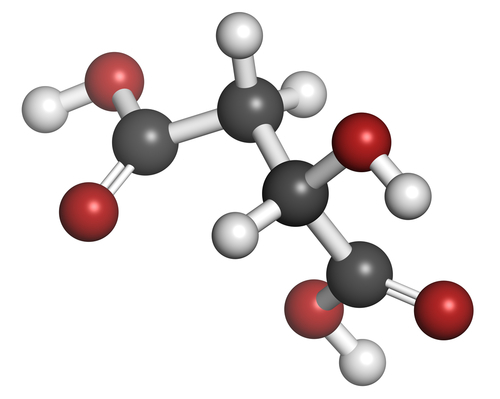Is Malic Acid Bad For You?
Also Known As: C4H6O5
Short answer
Malic acid in its natural form is very beneficial to our health. When artificially made in a lab, it can be more harmful than helpful.
A fairly even ratio of beneficial and harmful qualities. Moderation is important. Very general topics that can lean towards both sides of the spectrum will be placed here as well. Rice, for example, can be good or bad depending on the type.
View Full Grading System
Category 'A'
Very healthy and numerous health benefits. Side effects are rare. Things rated an 'A+' are typically necessary for survival (for example, water).
Very healthy and numerous health benefits. A few harmful qualities may be associated, but only under certain circumstances such as an allergic reaction.
Very healthy and numerous health benefits. Harmful qualities may be associated, but aren't usually serious.
It is important to note that even the best things in life can become bad in immoderate amounts. So, although something may be rated an 'A+', overconsumption/overdoing can bring unwanted effects.
Category 'B'
Very beneficial to your health. Things rated a 'B+' may have a few harmful qualities to pay attention to.
Overall beneficial to your health. Things rated a 'B' may have some harmful qualities to pay attention to.
More beneficial to your health than not. However, harmful qualities are most likely associated and shouldn't be overlooked.
The main difference between category 'A' and category 'B' is the harmful qualities typically present in 'B' items. Serious side effects are usually uncommon, but are still possible and should be taken note of.
Category 'C'
Both beneficial and harmful qualities associated. Things rated a 'C+' are typically a bit more on the beneficial side. Still, moderation is important.
A fairly even ratio of beneficial and harmful qualities. Moderation is important. Very general topics that can lean towards both sides of the spectrum will be placed here as well. Rice, for example, can be good or bad depending on the type.
More harmful than beneficial. Side effects are common, especially when consumed/done excessively. Moderation is very important.
Category 'C' usually denotes to both good and bad qualities. When it comes to this category, it is important to keep this word in mind: moderation.
Category 'D'
Harmful to your health. Although benefits may be associated, the bad most likely outweighs the good. Moderation is very important.
Harmful to your health. A few benefits may be associated, but the bad outweighs the good. Moderation is extremely important.
Harmful to your health. Very few, if any, benefits are present. Things in this category should be avoided as much as possible.
Category 'D' is typically for things that are more harmful than beneficial. While consuming/doing something unhealthy once in a blue moon shouldn't hurt, we definitely recommend eliminating 'D' items as a regular part of your routine/diet.
Category 'F'
Category 'F' is for things that fail to bring anything beneficial to the table, and are very harmful to your health. We recommend completely avoiding anything in this category. Long-term side effects of 'F' items are usually very serious.
Category 'N'
'N' stands for neutral. Things placed into this category are generally (a) neither good nor bad for you, or (b) lack the necessary evidence to reach any conclusions.
Long answer
What is malic acid used for? Malic acid is mainly used as an artificial preservative in fruit-flavored beverages because it adds tartness and has a long-lasting flavor, masking the bad aftertaste of artificial sweeteners. It’s also commonly used in candies, gum, fruit butters, jams, jellies and ice cream.
Something to keep in mind is that malic acid naturally comes from fruits and vegetables, mostly apples, and it is an acid. It’s more acidic than citric acid (from lemons), ascorbic acid or vitamin C. Acids can damage tooth enamel because of their low PH level.
These foods that contain the artificial malic acid, like gum and hard candy, are held in the mouth for a longer period of time than an apple would be, which means they are even more harmful to your teeth. Not only can it destroy tooth enamel, but it puts your teeth at risk of getting cavities.
Candies containing malic acid that are extremely sour usually warn that excessive consumption may cause irritation of the mouth, throat or stomach. If someone starts to experience these problems along with gas, diarrhea, and an upset stomach, they should stop eating foods containing malic acid because the side effects could be prolonged.
Anyone diagnosed with a gastrointestinal condition should avoid malic acid in all foods and drinks in order to prevent acid reflux and stomach irritation. Malic acid could make already existing symptoms worse.
We need to remember that natural malic acid from fruits and vegetables does have some significant heath benefits. However, when used as an artificial preservative in candies and jams, and processed foods and drinks, it no longer has these same benefits.
Possible short-term side effects
- irritation of the mouth, throat or stomach
-
gas
-
diarrhea
-
upset stomach
-
acid reflux
Possible long-term side effects
Commonly found in
- fruit-flavored beverages
-
candies
-
sherbet
-
chewing gum
-
fruit preserves
-
bakery items w/ fruit fillings
-
soy yogurt
Please turn your Ad Blocker off to see this content. Thank you!
Thank you for your feedback!
Written by Aubrie Robinson
Published on: 05-18-2016
Last updated: 12-10-2016
Thank you for your feedback!
Written by Aubrie Robinson
Published on: 05-18-2016
Last updated: 12-10-2016


 Approved by
Approved by 














